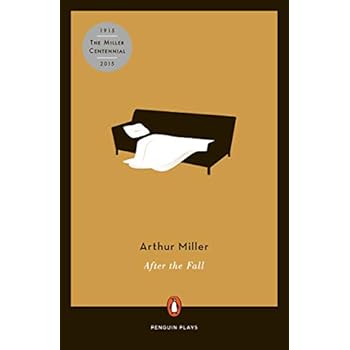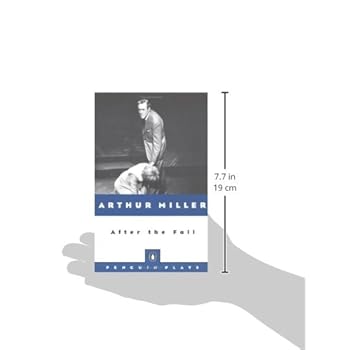After the Fall: A Play in Two Acts (Penguin Plays)
Category: Books,Arts & Photography,Performing Arts
After the Fall: A Play in Two Acts (Penguin Plays) Details
About the Author Arthur Miller was born in New York City in 1915 and studied at the University of Michigan. His plays include All My Sons (1947), Death of a Salesman (1949), The Crucible (1953), A View from the Bridge and A Memory of Two Mondays (1955), After the Fall (1963), Incident at Vichy (1964), The Price (1968), The Creation of the World and Other Business (1972) and The American Clock. He has also written two novels, Focus (1945), and The Misfits, which was filmed in 1960, and the text for In Russia (1969), Chinese Encounters (1979), and In the Country (1977), three books of photographs by his wife, Inge Morath. More recent works include a memoir, Timebends (1987), and the plays The Ride Down Mt. Morgan (1991), The Last Yankee (1993), Broken Glass (1993), which won the Olivier Award for Best Play of the London Season, and Mr. Peter's Connections (1998). His latest book is On Politics and the Art of Acting. Miller was granted with the 2001 Medal for Distinguished Contribution to American Letters. He has twice won the New York Drama Critics Circle Award, and in 1949 he was awarded the Pulitzer Prize. Read more

Reviews
Arthur Miller's "After the Fall" takes the form of an investigation into the forces which give rise to incomplete and destructive human relationships. Its protagonist, Quentin, in whose mind the play is enacted, subscribes to a simple credo: "You tell the truth, even against yourself." The play is fabricated as a trial or, more fittingly, an inquest in which the moralist, Quentin, sits in judgment upon his own conscience, his own values, his own actions.Quentin, now retired from the practice of law, examines and cross-examines all aspects of his being: his distorted emotions, marital complexities, and other intimate struggles. The result is that "After the Fall" becomes a big, demanding drama. When staged, the play typically occupies a full three and a half hours, time spent in a relentless search for answers. Has Quentin's life been lived in good faith? Can, in his remaining years, he reach beyond self-condemnation to some measure of hope? A tortured process of self-discovery finds him fighting against innate fear, his unwillingness to unearth what Miller labels "the seeds of his own destruction." It is a fundamental, personal need to know that serves as the backbone of this otherwise a loosely structured play. Whether you are reading the dialog and stage direction on the page, or are sitting in a theater audience, you will likely be engrossed in his journey, since this is your journey too.For the personal is the universal. At the same time as we are learning of intimate events in Quentin's life, a universal drama unfolds. Miller's intent is for "After the Fall" to present a broad study of mankind's terrible predisposition to cruelty, our evasions of responsibility, and our final seizure by remorse. After wildly ranging over times past, the play returns us to the present where Quentin is considering marrying a German woman who survived the Holocaust -- an experience that permitted her to accept human blindness and failures. She is the catalyst helping him universalize his personal predicament. The climactic scene in this process finds Quentin pausing in the shadow of an imagined concentration camp tower looming over his meager self. He asks: "Who can be innocent again on this mountain of skulls? I tell you what I know! My brothers died here . . . but my brothers built this place; our hearts have cut these stones! And what's the cure!"It is in "After the Fall" that Miller strives, with a greater urgency than in any of his other theater works, to enter into a dialog with essential works of twentieth-century thought and literature. Consider "Gerontion" (1920), in which T.S. Eliot posed the key question: "After such knowledge, what forgiveness?" Notice how, at the close of "After the Fall," Quentin seemingly confronts Eliot's entreaty: "Is the knowing all? And the wish to kill is never killed, but with some gift of courage one may look into its face when it appears, and with a stroke of love -- as to an idiot in the house -- forgive it; again and again . . . forever?"Again and again: There was something in Miller's plea that reminded me of words uttered just a few years after the opening of "After the Fall." Before a stunned audience in Indianapolis, Indiana, on an evening in 1968 when news spread of the Rev. Martin Luther King's assassination, Robert F. Kennedy spoke. Without notes, at first haltingly but then with earned authority, Kennedy urged upon us this credo:"We have to make an effort to understand, to get beyond, to go beyond these rather difficult times . . . . Aeschylus once wrote: `Even in our sleep, pain which cannot forget, falls drop by drop upon the heart, until in our own despair, against our will, comes wisdom, through the awful grace of god.' What we need . . . is not division . . . not hatred . . . not violence and lawlessness . . . but is love and wisdom and compassion toward one another: A feeling of justice."



